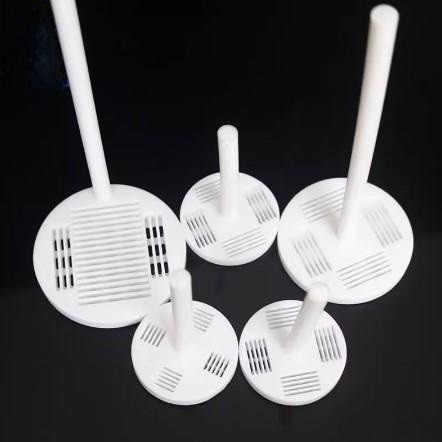
PTFE material
Custom Machined and Molded PTFE Teflon Parts Manufacturer for Laboratory ITO FTO Conductive Glass Cleaning Flower Basket
Item Number : PTFE-13
Price varies based on specs and customizations
- Material
- PTFE
- Specification
- See the form
Shipping:
Contact us to get shipping details Enjoy On-time Dispatch Guarantee.
Why Choose Us
Easy ordering process, quality products, and dedicated support for your business success.
Introduction
PTFE flower baskets (Teflon flower baskets) are made of high-purity experimental grade PTFE, with excellent chemical stability, corrosion resistance, sealing and high and low temperature resistance (-180°C to +250°C).
We provide customized services such as PTFE cleaning racks and flower baskets for glass substrates (such as ITO, FTO, silicon wafers, etc.), and provide free design and drawing services based on your description or sketch to ensure that various industry needs are met.
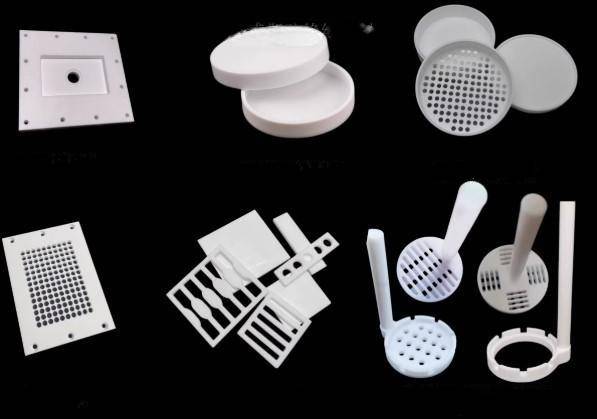
Detail & Parts




Technical specifications
| Diameter*groove width*groove length*applicable capacity | |
| 60mm*1.5mm*16mm*250ml beaker/20 pcs | 60mm*2.5mm*16mm*250ml beaker/20 pcs |
| 60mm*1.5mm*21mm*250ml beaker/20 pcs | 60mm*2.5mm*21mm*250ml beaker/20 pcs |
| 80mm*1.5mm*26mm*500ml beaker/20 pcs | 80mm*2.5mm*26mm*500ml beaker/20 pcs |
| 80mm*1.5mm*31mm*500ml beaker/20 pcs | 80mm*2.5mm*31mm*500ml beaker/20 pcs |
| 90mm*2.5mm*41mm*1000ml beaker/22 pcs | |
The products we show are available in different sizes and custom sizes are available on request.
Application
PTFE cleaning frame is a high molecular compound polymerized by tetrafluoroethylene, which has excellent chemical stability and corrosion resistance. Teflon series utensils have been used in laboratories for long-term storage of standard solutions, standard samples, organic solvents, highly corrosive samples, and scientific research samples due to their extremely low metal element blank value and superior chemical properties.
- Laboratory Storage: Suitable for long-term storage of standard solutions, organic solvents, and corrosive samples.
- Photovoltaic and Semiconductor Industries: Essential for cleaning and handling delicate components without causing damage.
- Solar Energy Industry: Used to protect and preserve components in solar energy systems during cleaning.
- Scientific Research: Vital for corrosion-free handling and storage of sensitive materials and samples.
- PTFE cleaning baskets offer superior chemical properties, wide temperature tolerance, and non-adhesive characteristics, making them invaluable in various industrial and laboratory applications.
Advantages
- Excellent Chemical Resistance: PTFE/PTFE is highly resistant to all chemical solvents, including strong acids and alkalis.
- Wide Temperature Range: It withstands extreme temperatures from -200°C to +250°C.
- Non-Adhesive: PTFE does not stick to any substance, making it easy to clean.
- Safe Sample Handling: Ideal for sample digestion, pickling, boiling, and drying processes.
- Non-Toxic and Biocompatible: Physiologically inert and safe for contact with sensitive materials and biological samples.
Designed for You
KinTek provide deep custom made service and equipment to worldwide customers, our specialized teamwork and rich experienced engineers are capable to undertake the custom tailoring hardware and software equipment requirements, and help our customer to build up the exclusive and personalized equipment and solution!
Would you please drop your ideas to us, our engineers are ready for you now!
Trusted by Industry Leaders

FAQ
What Is A Press Mold?
What Is Press Mould In Ceramics?
How Are Pellet Molds Used?
What Types Of Materials Can Be Pelletized Using Pellet Molds?
How Can One Select The Appropriate Pellet Mold For Their Specific Application?
4.9 / 5
Speedy delivery and fantastic value for money!
4.7 / 5
Excellent quality and durability.
4.8 / 5
Cutting-edge technology that simplifies my experiments.
4.6 / 5
This product has revolutionized my lab's cleaning process.
4.9 / 5
Incredible time saver and highly efficient.
4.7 / 5
Durable construction and easy to use.
4.8 / 5
Innovative design that streamlines my lab workflow.
4.6 / 5
Excellent customer service and technical support.
4.9 / 5
Highly recommended for any laboratory setting.
4.7 / 5
Exceptional quality and value.
4.8 / 5
Advanced technology that meets all my laboratory needs.
4.6 / 5
Reliable and dependable product.
4.9 / 5
Exceptional performance and easy maintenance.
4.7 / 5
Great value for money and highly efficient.
4.8 / 5
Innovative and practical solution for laboratory cleaning.
REQUEST A QUOTE
Our professional team will reply to you within one business day. Please feel free to contact us!
Related Products

Custom PTFE Teflon Parts Manufacturer Corrosion Resistant Cleaning Rack Flower Basket
The PTFE cleaning rack, also known as the PTFE flower basket cleaning flower basket, is a specialized laboratory tool designed for the efficient cleaning of PTFE materials. This cleaning rack ensures thorough and safe cleaning of PTFE items, maintaining their integrity and performance in laboratory settings.

Custom PTFE Teflon Parts Manufacturer for PTFE Measuring Cylinder 10/50/100ml
PTFE measuring cylinder are a rugged alternative to traditional glass cylinders. They are chemically inert over a wide temperature range (up to 260º C), have excellent corrosion resistance and maintain a low coefficient of friction, ensuring ease of use and cleaning.
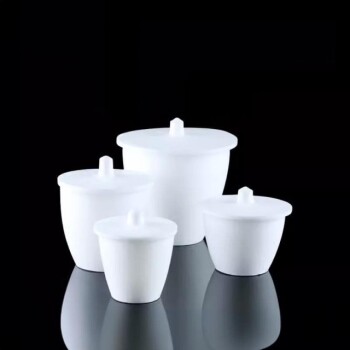
Custom Machined and Molded PTFE Teflon Parts Manufacturer with PTFE Crucible and Lid
PTFE crucibles, made from pure Teflon, offer chemical inertness and resistance from -196°C to 280°C, ensuring compatibility with a wide range of temperatures and chemicals. These crucibles feature machine-finished surfaces for easy cleaning and prevention of contamination, making them ideal for precise laboratory applications.
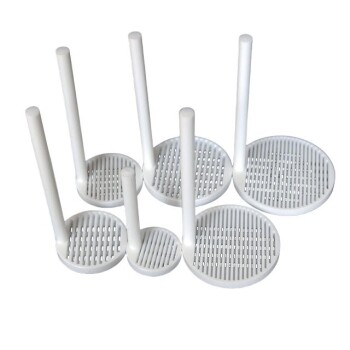
Custom PTFE Teflon Parts Manufacturer for Cleaning Racks
PTFE cleaning racks are mainly made of tetrafluoroethylene. PTFE, known as the "King of Plastics", is a polymer compound made of tetrafluoroethylene.

Custom PTFE Teflon Parts Manufacturer Adjustable Height Flower Basket
The flower basket is made of PTFE, which is a chemically inert material. This makes it resistant to most acids and bases, and it can be used in a wide variety of applications.
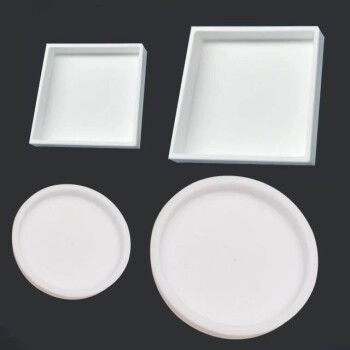
Custom PTFE Teflon Parts Manufacturer for PTFE Containers
PTFE container is a container with excellent corrosion resistance and chemical inertness.

Custom PTFE Teflon Parts Manufacturer for Hollow Cleaning Basket and Rack Carrier
The PTFE hollow cleaning flower basket is a specialized laboratory tool designed for efficient and safe cleaning processes. Made from high-quality polytetrafluoroethylene (PTFE), this basket offers exceptional resistance to acids, alkalis, and organic solvents, ensuring durability and reliability in various chemical environments.
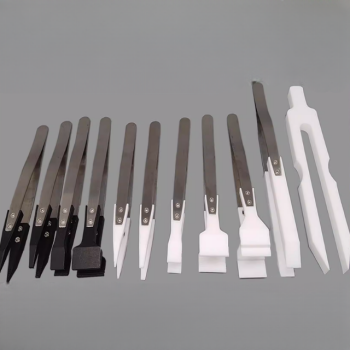
Custom PTFE Teflon Parts Manufacturer for PTFE Tweezers
PTFE tweezers inherit the excellent physical and chemical properties of PTFE, such as high temperature resistance, cold resistance, acid and alkali resistance, and corrosion resistance to most organic solvents.
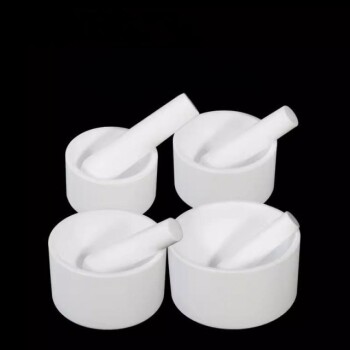
Custom PTFE Teflon Parts Manufacturer Grinding Bowl
PTFE is renowned for its exceptional chemical resistance, thermal stability, and low friction properties, making it a versatile material in various industries. The PTFE grinding bowl, specifically, finds applications where these properties are crucial.

Custom PTFE Teflon Parts Manufacturer PTFE Beaker and Lids
The PTFE beaker is a laboratory container that is resistant to acid, alkali, high and low temperatures and is suitable for temperatures ranging from -200ºC to +250ºC. This beaker has excellent chemical stability and is widely used for heat treatment samples and volume analysis.
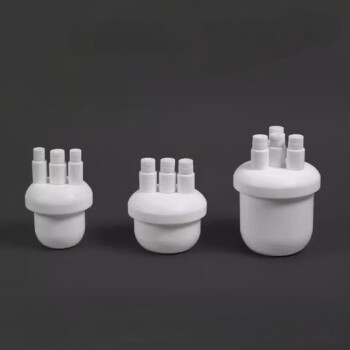
Custom PTFE Teflon Parts Manufacturer for Three-Necked Round Bottom Flask
PTFE flask, is a versatile laboratory container made from PTFE, offering exceptional chemical resistance, temperature stability, and non-stick properties. Ideal for handling corrosive substances and high-temperature applications, these flasks are essential in various laboratory procedures, including heating, mixing, and storage of chemicals.
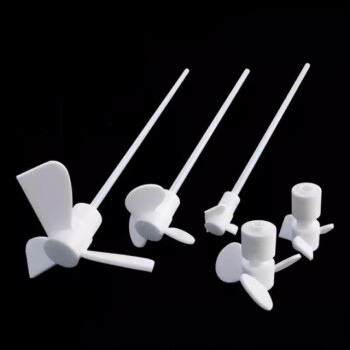
Custom PTFE Teflon Parts Manufacturer Laboratory High Temperature Mixing Paddle Mixer
The PTFE mixing paddle mixer is a versatile and robust tool designed for laboratory use, particularly in environments requiring high resistance to chemicals and extreme temperatures. Crafted from high-quality PTFE, this mixer boasts several key features that enhance its functionality and durability.

Custom PTFE Teflon Parts Manufacturer for Magnetic Stirring Bar
The PTFE magnetic stirring bar, made from high-quality PTFE, offers exceptional resistance to acids, alkalis, and organic solvents, coupled with high-temperature stability and low friction. Ideal for laboratory use, these stirring bars are compatible with standard flask ports, ensuring stability and safety during operations.
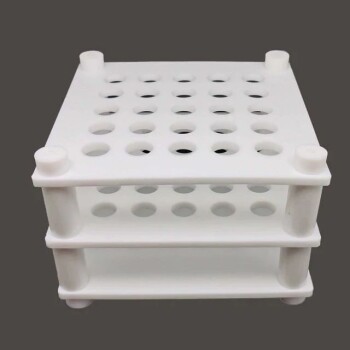
Custom PTFE Teflon Parts Manufacturer for Centrifuge Tube Racks
The precision-made PTFE test tube racks are completely inert and, due to the high temperature properties of PTFE, these test tube racks can be sterilized (autoclaved) without any problems.

Custom PTFE Teflon Parts Manufacturer F4 Conical Flask Triangular Flask 50 100 250ml
The PTFE triangular flask, also known as a Teflon reagent bottle, is a robust, chemical-resistant alternative to traditional glass bottles, suitable for handling both acids and alkalis. These bottles are unbreakable, lightweight, and feature a leak-proof screw cap, making them ideal for laboratory use.
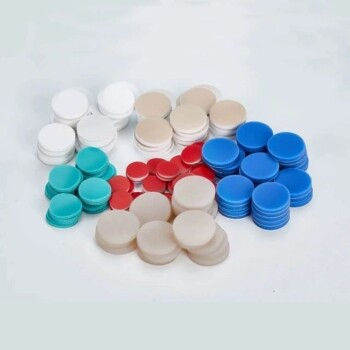
Custom PTFE Teflon Parts Manufacturer for Gaskets and More
Gaskets are materials placed between two flat surfaces to enhance the seal. To prevent fluid leakage, sealing elements are arranged between static sealing surfaces.
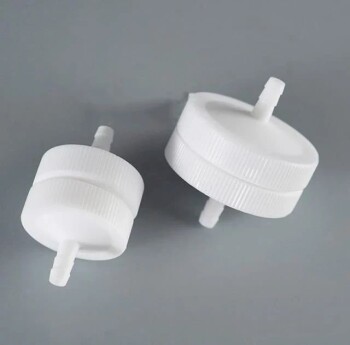
Custom PTFE Teflon Parts Manufacturer for Sampling Filters
PTFE filter element is a commonly used industrial filter element, mainly used to filter corrosive media such as high-purity chemical substances, strong acids, and strong alkalis.

Custom PTFE Teflon Parts Manufacturer for Sampling Solution Sample and Dry Powder Spoons
The PTFE sampling spoon, also known as a solution spoon or sample spoon, is a crucial tool for accurately introducing dry powder samples in various analytical processes. Made from PTFE, these spoons offer excellent chemical stability, corrosion resistance, and non-stick properties, making them ideal for handling delicate and reactive substances in laboratory settings.
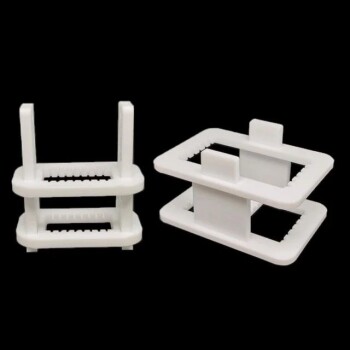
Custom PTFE Teflon Parts Manufacturer for Conductive Glass Substrate Cleaning Rack
The PTFE conductive glass substrate cleaning rack is used as the carrier of the square solar cell silicon wafer to ensure efficient and pollution-free handling during the cleaning process.
Related Articles

Versatile Applications of PTFE Cleaning Racks: Enhancing Laboratory Efficiency and Precision
Delve into the diverse applications of PTFE cleaning racks in laboratory settings. Discover how these essential tools optimize cleaning processes, enhance precision, and contribute to overall laboratory efficiency and accuracy.

PTFE Cleaning Racks: The Ultimate Guide to Cleaning and Drying Labware
In this comprehensive guide, we'll delve into the world of PTFE cleaning racks, exploring their benefits, applications, and the best practices for cleaning and drying labware to ensure optimal performance and longevity.

A Step-by-Step Guide to Cleaning Laboratory Glassware
Maintaining clean and sterile glassware is crucial in any laboratory setting. Not only is it important for the accuracy and reliability of experiments, it is also essential for the safety of those working in the lab.

How To Clean Laboratory Glassware - Part 2
How To Clean Laboratory Glassware? Here are some considerations and tips.

How To Clean Laboratory Glassware - Part 1
Cleaning laboratory glassware isn't as simple as washing the dishes. Here's how to wash your glassware so that you won't ruin your chemical solution or laboratory experiment.

PTFE Shovel: A Comprehensive Guide to Its Uses, Advantages, and Applications
Discover the versatile applications of PTFE shovels in various industries, including their unique properties, benefits, and real-world examples. Explore the advantages of PTFE shovels over traditional materials and delve into the specific uses in laboratory settings.

Glassware vs. Plasticware - Which is the Better Choice for Your Needs?
Both glassware and plasticware have their own advantages and disadvantages, and the choice between the two will depend on the specific needs of your laboratory.

Revolutionize Your Spectroscopy Analysis with FTIR Pellet Press
FTIR (Fourier Transform Infrared) spectroscopy is a widely used technique to analyze the chemical composition of various materials. This method is particularly useful for samples that are difficult to analyze using other techniques.

How FTIR Pellet Press Works in Sample Preparation for Spectroscopy Analysis
FTIR (Fourier Transform Infrared) spectroscopy is a powerful analytical technique for identifying and characterizing chemical compounds based on their infrared absorption spectra.

5 Essential Applications of Rotary Evaporator in Labs
Rotary evaporators, also known as rotovaps, are laboratory instruments used for distillation, concentration, and purification of samples. They are widely used in the chemical, pharmaceutical, and food and beverage industries for various applications.

How to Use FTIR Pellet Press to Prepare Samples for Analysis
Fourier Transform Infrared (FTIR) spectroscopy is a powerful analytical technique used to identify and quantify chemical compounds in a wide range of samples. FTIR analysis requires the sample to be in the form of a pellet, which is prepared by compressing the sample with a suitable matrix material.

Unveiling the Versatility of Heated Lab Presses: A Comprehensive Guide
Explore the world of Heated Lab Presses, delving into their types, applications, key features, safety measures, and maintenance tips. Discover how these versatile tools empower laboratories across diverse industries.